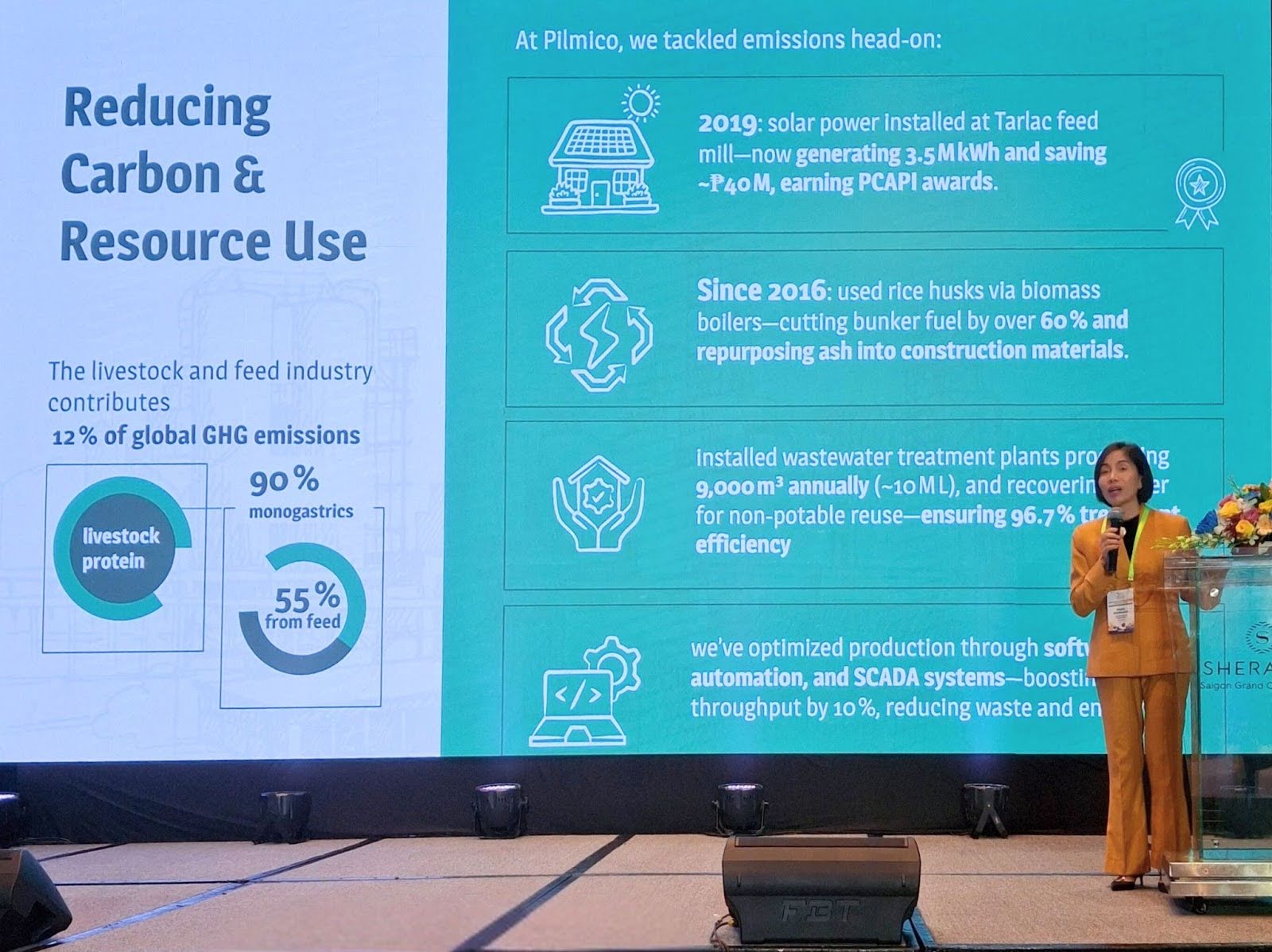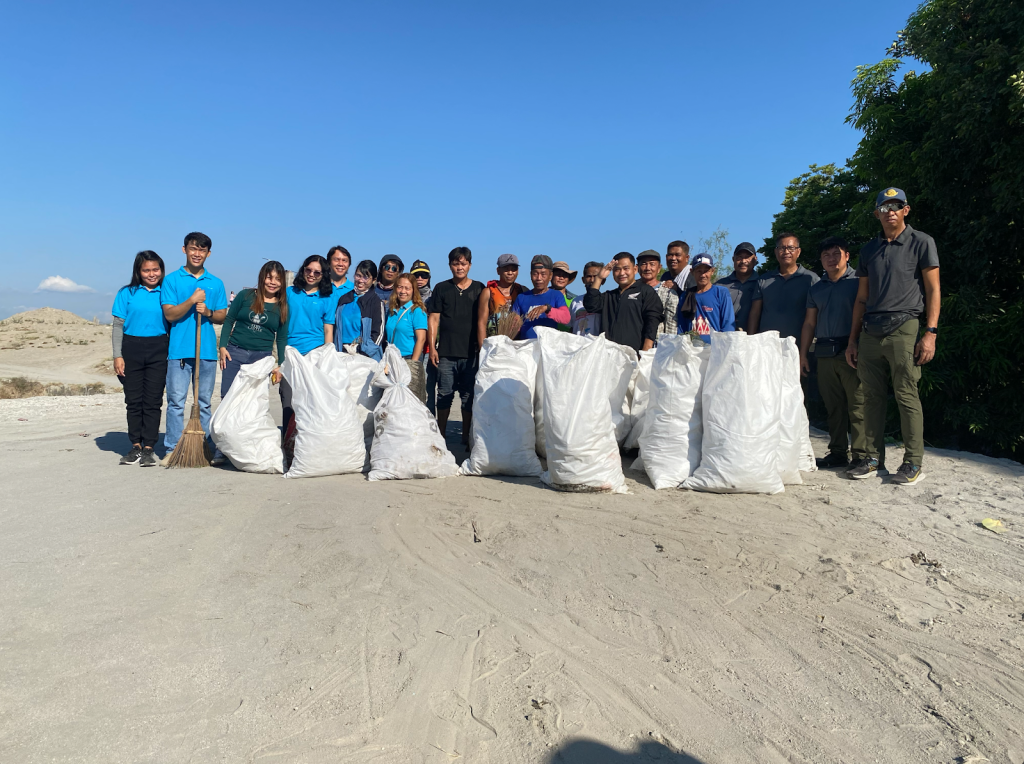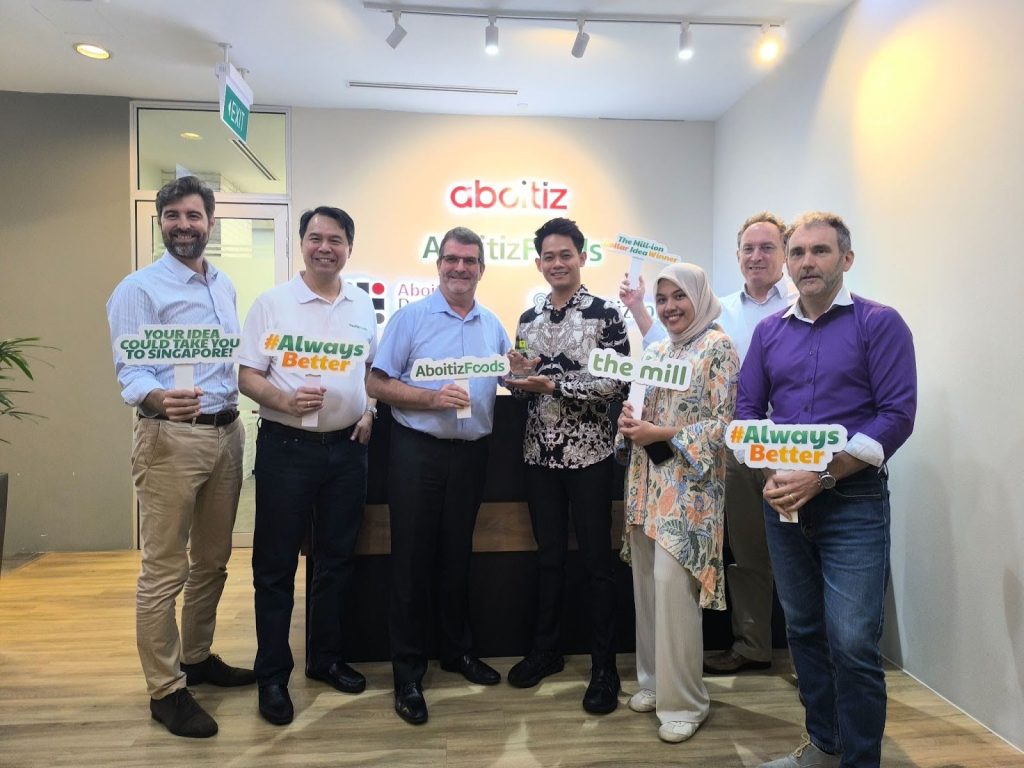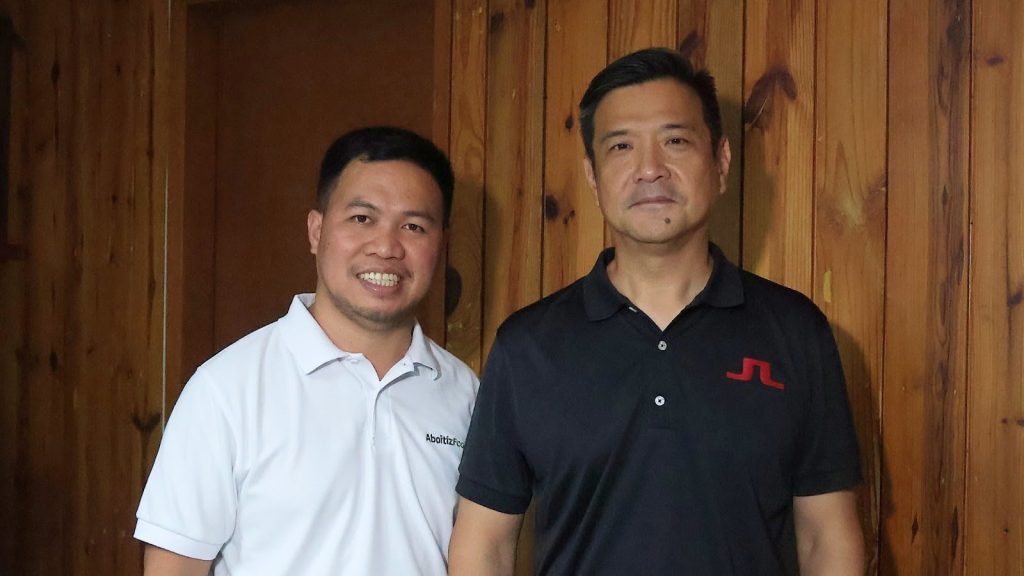Ho Chi Minh City, Vietnam, 19 June 2025—Norie Bermudez, Country Director for Agribusiness—Philippines at Aboitiz Foods, was invited to speak at the U.S. Soybean Export Council (USSEC) 30th Anniversary conference, USSEC 30th Anniversary in Vietnam: Sustainable Solutions with U.S. Soy. In her talk, she underscored the importance of social sustainability, spotlighting how education, community partnerships, and responsible operations can create a lasting impact across the food value chain. From developing talent within the organization to enabling grassroots livelihoods, her message was clear: sustainable growth begins with people.
Across feed mills, farms, and community programs, the shared mindset and commitment of individuals enabled real progress. At Aboitiz Foods, our journey toward sustainability is powered by our people, who are the ultimate enablers of meaningful and lasting impact.
As prepared for delivery:
Good morning, everyone.
I am Norie Bermudez, the Country Director for the Philippines at Aboitiz Foods. As one of the largest animal feeds players in Asia Pacific, we are part of the Aboitiz Group, a diversified conglomerate in the Philippines with a rich history spanning over a century. Our operations span eight countries in Asia—the Philippines, Vietnam, China, Malaysia, Indonesia, Thailand, Brunei, and Singapore—and cover a range of businesses including flour milling, animal feeds manufacturing, swine and layer production for pork and eggs, as well as commodities trading.
I’m honored to join this meaningful discussion and share how, from an integrator’s perspective, sustainability—as well as the social dimension of ESG—is both our responsibility and our opportunity to make a lasting impact and difference.
When we speak of sustainability in our industry, the conversation often leans toward emissions, governance, or production efficiency. While those are essential, today I’d like to shift the focus toward the people who make the system work.
As integrators, we hold a unique role. Beyond managing value chains, we shape the lives within them. Our responsibility extends from mill to meal, from boardroom to barangay.
And in doing so, we turn sustainability into something more long-term.
Understanding the “S” in ESG: More Than Compliance
When we speak of ESG, the “S”—social—is sometimes the least understood. But for those of us in the feed industry, it is perhaps the most human. It asks us to care for our people, uplift our communities, and act with integrity across the value chain.
It’s about ensuring safe and decent work, promoting education and well-being, and enabling livelihoods to thrive — from the farmer in the field to the family at the table.
This aligns closely with Education for Sustainable Development, or ESD. ESD emphasizes not just actions, but capacity-building: empowering individuals and communities with the knowledge, skills, values, and mindsets to make informed, sustainable choices.
In this light, ESG is not simply a framework. It becomes a way of thinking — a commitment to grow responsibly while helping others do the same.
That’s why we approach social sustainability through a simple but powerful lens:
- We Learn – by investing in our people’s growth and wellbeing
- We Teach – by sharing knowledge and tools with farmers and communities
- We Grow Together – by building systems that uplift everyone in the value chain
III. We Learn: Internal Capacity Building (2.5 min)
Sustainability starts from within. At Aboitiz Foods, we believe that when our people are empowered, our impact extends outward.
That’s why we invest in our capacity to lead. Through our annual Leadership Conference (LeadCon) and other learning programs, we don’t just focus on technical training; we develop leadership potential across all levels. Whether you’re a mill operator or a future manager, continuous learning is part of our culture.
We also ensure that our people work in safe, healthy, and fair environments. Regular safety training, mental wellness initiatives, and equitable labor practices aren’t just compliance requirements for us—they’re part of what it means to value our workforce.
More importantly, learning doesn’t happen in silos. Across the region, our teams regularly exchange best practices. Ideas travel from one country to another, ensuring that innovation is not isolated but shared.
We Teach: Extending Knowledge to Communities
Our role as integrators allows us to act not just as producers but as enablers of progress, especially at the grassroots level.
This is especially evident in our work through the flour division. In partnership with the Technical Education and Skills Development Authority (TESDA), we have established a bakery training facility, providing aspiring bakers and entrepreneurs with hands-on skills in baking, food safety, and business fundamentals.
But skills alone are not enough. That is why we complement training with bakery starter kits and even complete bakery facilities, helping graduates turn what they have learned into sustainable livelihoods. This creates real opportunities—not only for individual income but also for contributing to stronger local economies.
This same principle guides our broader community engagement. Through workshops and local fairs, we promote entrepreneurship, financial literacy, and agricultural know-how, building both capacity and resilience in the communities we serve.
In addition to our bakery programs, we continue to provide livestock-based livelihood support, from gilt and piglet dispersal, always paired with technical training and veterinary support to ensure long-term success.
Through these livelihood programs, we help expand both educational and economic opportunities at the community level.
Because when communities grow stronger, so do the ecosystems in which we operate.
We Grow Together: Ecosystem Impact and Shared Progress
We do not operate in isolation. We grow when our entire ecosystem grows. That’s why our approach integrates innovation, sustainability, and community, ensuring our impact is both far-reaching and enduring.
As shifting consumption patterns reshape the animal protein and feed markets, we’re responding with solutions that are both sustainable and scalable.
Through precision nutrition and genetic improvement, we’re fine-tuning feed formulations and livestock breeds to improve feed conversion efficiency and reduce resource waste. Across the value chain, we’re harnessing technology through automation, artificial intelligence, and IoT to make farming practices more innovative, resilient, and efficient. These science-backed approaches allow us to deliver better outcomes for farmers, animals, and the environment, strengthening the entire value chain from the ground up.
Our commitment to education extends beyond people to practices, especially when it comes to biosecurity. In response to the threat of African Swine Fever, we launched #M3Time, a flagship campaign that empowers backyard farmers with practical, easy-to-implement solutions: Maglinis (Clean), Magtanong (Ask), and Manigurado (Ensure). By simplifying biosecurity, M3Time helps farmers take charge of herd health and protect their communities, turning awareness into everyday action.
We also strengthen impact through partnerships. Working with NGOs, USSEC, TESDA, and other industry stakeholders, we co-create programs that support food security, climate resilience, and inclusive growth. From bakery starter kits to livestock dispersal, our livelihood programs are always paired with training and continuous support to ensure these tools create real, lasting impact rather than just providing short-term relief.
And we hold ourselves accountable—through audits, trade seminars, and industry dialogues—to ensure that we continually improve our practices and contribute meaningfully to the broader ecosystem.
Operational Sustainability: Reducing Carbon & Resource Use
For us, sustainability is more than just a policy to follow and implement. We believe that sustainability is influenced not only by what we do but also by how we do it. Guided by our values of integrity and responsibility, our teams are motivated by the belief that every choice we make—no matter how small—has an impact.
Our team understands that every feed pellet produced has an environmental footprint. In an industry responsible for 12% of global greenhouse gas emissions—55% of which are feed-related in monogastric systems like pork, chicken, and eggs—this awareness shapes the way we work.
That’s why we’ve taken decisive steps to reduce our impact.
- We were among the first in the Philippines to install solar panels at our Tarlac feed mill, generating 3.5 million kilowatt-hours and saving nearly ₱40 million to date—earning recognition from the Pollution Control Association of the Philippines, Inc. (PCAPI).
- Since 2016, we’ve replaced most of our bunker fuel with rice husks through biomass boilers, reducing emissions and repurposing ash into materials for local construction.
- Our wastewater treatment plants process 9,000 cubic meters annually, recovering water for reuse and achieving a treatment efficiency rate of 96.7%.
- Automation and SCADA systems have helped us boost production by 10%, while cutting energy use and waste.
Beyond our facilities, we continue to lead through accountability. As one of the pioneers of the Extended Producer Responsibility (EPR) Act, Pilmico has already surpassed the country’s 2024 plastic recovery target, reaching 60%, well ahead of the 2025 mandate.
Ultimately, these achievements reflect not just systems, but a culture of people who take responsibility seriously, who believe that every operational improvement is a contribution to the greater good.
Conclusion – The Heart of Sustainable Growth
These actions—whether in clean energy, waste reduction, or responsible production—are driven not just by systems or policies, but by people. It’s the shared mindset of our teams, partners, and communities that brings our sustainability efforts to life.
Because at the heart of every feed mill, farm, and program are individuals who are deeply committed to doing things right.
The people behind the feed industry—farmers, employees, partners—are not just contributors to ESG outcomes. They are the reason ESG matters at all.
When we educate, we enable. When we share, we strengthen. And when we grow together, we sustain not just business, but the communities and ecosystems we serve.
We remain committed to nurturing not only our operations, but also the people and places that bring them to life, ensuring that our impact today builds the capabilities and confidence needed for a more resilient tomorrow.
Let us continue to lead with empathy, invest in people, and build a more inclusive, resilient future from mill to meal.
Thank you.




